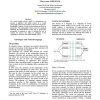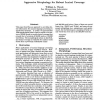ICASSP
2011
IEEE
12 years 8 months ago
2011
IEEE
In this paper, the task of selecting the optimal subset of pronunciation variants from a set of automatically generated candidates is recast as a tree search problem. In this appr...
COLING
2010
12 years 11 months ago
2010
Our goal is to propose a description model for the lexicon. We describe a software framework for representing the lexicon and its variations called Proteus. Various examples show ...
FLAIRS
2009
13 years 2 months ago
2009
For certain disable persons unable to communicate, we present a palliative aid which consist of a virtual pictographic keyboard associated to a text processing from a pictographic...
EMNLP
2009
13 years 2 months ago
2009
Sentiment analysis often relies on a semantic orientation lexicon of positive and negative words. A number of approaches have been proposed for creating such lexicons, but they te...
NAACL
2010
13 years 2 months ago
2010
We examine the viability of building large polarity lexicons semi-automatically from the web. We begin by describing a graph propagation framework inspired by previous work on con...
PAMI
2002
13 years 4 months ago
2002
The performance of any word recognizer depends on the lexicon presented. Usually large lexicons or lexicons containing similar entries pose greater difficulty for recognizers. How...
PAMI
2002
13 years 4 months ago
2002
This paper describes a handwritten character string recognition system for Japanese mail address reading on very large vocabulary. The address phrases are recognized as a whole bec...
COLING
2002
13 years 4 months ago
2002
A bilingual concept MRD is of significance for IE, MT, WSD and the like. However, it is reasonably difficult to build such a lexicon for there exist two ontologies, also, the evol...
ICASSP
2010
IEEE
13 years 4 months ago
2010
IEEE
Preparation of a lexicon for speech recognition systems can be a significant effort in languages where the written form is not exactly phonetic. On the other hand, in languages w...
ANLP
2000
13 years 6 months ago
2000
This paper describes an approach to providing lexical information for natural language processing in unrestricted domains. A system of approximately 1200 morphological rules is us...


